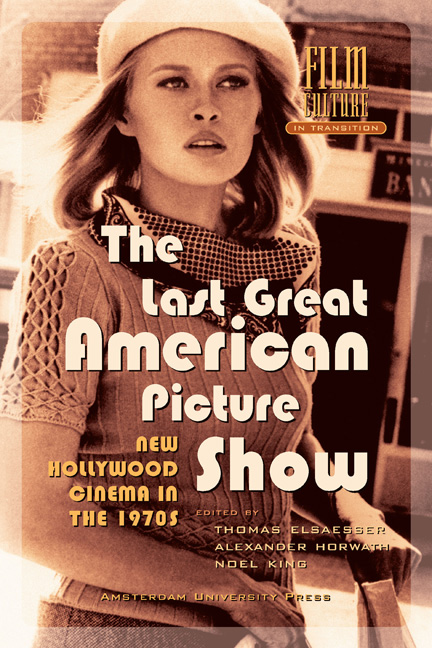”The Last Good Time We Ever Had”: Remembering the New Hollywood Cinema
Published online by Cambridge University Press: 25 January 2021
Summary
That an aesthetically experimental socially conscious cinema d’auteur could exist simultaneously with a burgeoning and rapacious blockbuster mentality was extraordinary, but it became the defining mark of 1970s cinema. That the two could co-exist for long, however, was an illusion as ephemeral as the notion of liberal ideological consensus.
Who the hell is talking to you like this? How old is he? The author is 52 and he loved the decade of the 1970s and its movies. We had movies then that you had to watch. Many of them had unfamiliar shapes, new narrative structures or strategies. They began late. They switched course. And they did not end well or happily or comfortably. Sometimes they broke off in your hands, or your mind.
The economic disaster of 1970 produced a lot of official proclamations of change, but in the final analysis things didn't change very much. For all the successes of a few small films, it was finally the more predictable successes of big films and big stars that carried Hollywood bookkeeping back into the black. Now, more than ever before, Hollywood is on the lookout for the “presold” project, the films that come with a formula for guaranteed success: films based on runaway best-sellers and hit plays, or films with stars who in themselves are so big that they generate their own publicity.
In A Confederate General at Big Sur, Richard Brautigan refers to “the last good time this country ever had.” As we move into the twenty-first century, that phrase also captures the way we are invited to remember the period of New Hollywood Cinema, as a brief moment of cinematic aesthetic adventure that happened between the mid-1960s and the mid to late 1970s and then vanished. In his recent history of this period, Lost Illusions, David Cook sees the years from 1969 to 1975 as an “aberration” (p.xvii), a “richly fruitful detour in the American cinema's march towards gigantism and global domination,” (p.xvii) as the franchise triumphs over the notion of the individual film. And in his review of the most recent edition of Robert Kolker's A Cinema of Loneliness, Jon Lewis, one of the most prominent of contemporary historians of contemporary Hollywood, refers to “this wonderful and brief moment” of New Hollywood.
- Type
- Chapter
- Information
- The Last Great American Picture ShowNew Hollywood Cinema in the 1970s, pp. 19 - 36Publisher: Amsterdam University PressPrint publication year: 2004



